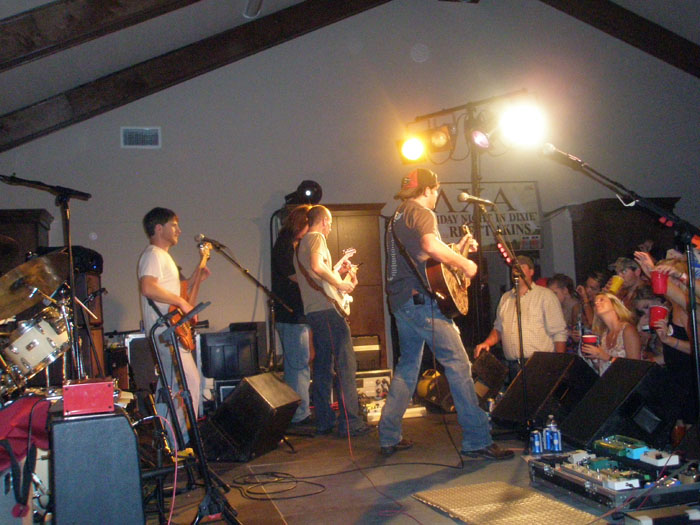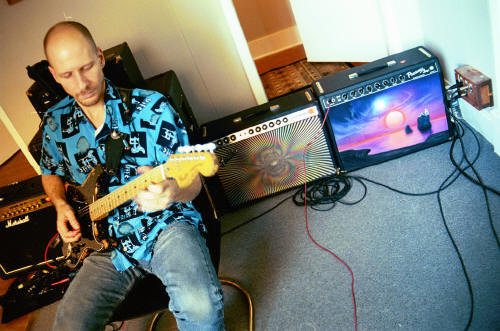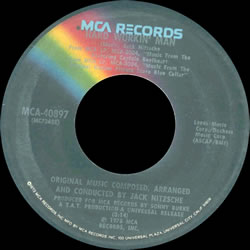music business
Rhett Akins at Old Threshers in Shelbina; What’s a Little Mud When You’ve Got Friends with Tractors?
This past weekend was one of the last outings of the 2010 festival season for Rhett Akins and gang. Like many things in life, outdoor festivals are like a potluck dinner – you never know what’s under the lid of that next casserole dish. That goes for not just the event itself, but to the friend and foe of every outdoor show – the weather. We’ll get to the weather debacle in a minute.
The event we would be playing on this eve was ‘The Old Threshers’ at the Shelbina Fairgrounds, in Shelbina Missouri. For those of you 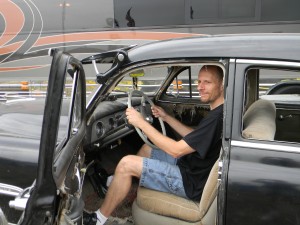 not in the know, an old threshers event is kind of a fair with a tractor theme, and this event sported some rare old beauties right out of yesteryear. After parking our bus and getting situated, we took a walk around the fairgrounds to see the sights. We didn’t get but 5 feet from the bus door when the first spectacle presented itself in the form of a 51 Chevy, the owner of which notified us that this vehicle was ours to use for the day. Who needs a runner when you’ve got a 51 Chevy at your disposal! After a few minutes of checking out and photographing this rarity, we set out on foot, camera in hand.
not in the know, an old threshers event is kind of a fair with a tractor theme, and this event sported some rare old beauties right out of yesteryear. After parking our bus and getting situated, we took a walk around the fairgrounds to see the sights. We didn’t get but 5 feet from the bus door when the first spectacle presented itself in the form of a 51 Chevy, the owner of which notified us that this vehicle was ours to use for the day. Who needs a runner when you’ve got a 51 Chevy at your disposal! After a few minutes of checking out and photographing this rarity, we set out on foot, camera in hand.
Right around the corner we stumbled upon a bluegrass band consisting of a couple of fellows on acoustic guitars, two banjo players, a woman playing a mandolin, they even had a wash tub base. They were pretty 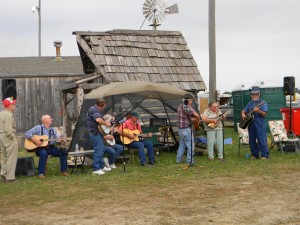 good too, and we stopped to listen for a few. It was then on to the blacksmith shop where we checked out some fine metal crafting by some locals. We dodged a few big tractors on the way over to an old schoolhouse, passing
good too, and we stopped to listen for a few. It was then on to the blacksmith shop where we checked out some fine metal crafting by some locals. We dodged a few big tractors on the way over to an old schoolhouse, passing 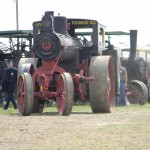 through an Amish village along the way. The old schoolhouse reeked of personality, circa late 1800s/early 1900s. As some kids were writing on the blackboard we took a look around, snapping a few more photos. This part of the day actually felt more like a class field trip than it did a gig. It was now getting to be time for load in, so we returned to the stage area to get to work.
through an Amish village along the way. The old schoolhouse reeked of personality, circa late 1800s/early 1900s. As some kids were writing on the blackboard we took a look around, snapping a few more photos. This part of the day actually felt more like a class field trip than it did a gig. It was now getting to be time for load in, so we returned to the stage area to get to work.
After our gear was loaded onto the deck, we set up and went about our sound check. Once we got it dialed in pretty good we took a few minutes to learn one of Rhett’s most recent songs, ‘Chicks, Trucks, and Beer’, a catchy little ditty with a funky beat he wrote a couple of days prior. It was then off to the hotel for showers, and this was when the weather started to go downhill. The sky grew dark, almost as black as night on the horizon, the wind picked up, and a short while later a massive downpour ensued. People were leaving in droves as we received over an inch of rain in about 45 minutes. Back on the deck, stagehands and local crew scurried to tarp the equipment, but nothing could be done to prevent the rest of this once dusty Fairgrounds from becoming one gigantic mud pit.
After the rain stopped, tractors began scraping down the mud in front of the stage. Underneath the mud was more mud, so they had to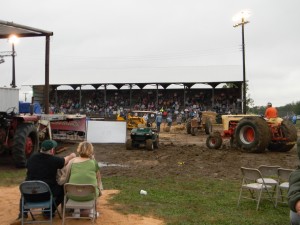 bring out bales of hay and spread straw to create acceptable conditions for the concertgoers. They also ran a series of boards for us to walk on from the stage to the bus (yes, the mud was actually that bad). Despite these obstacles we weren’t going to let a little rain and mud ruin this day, and by 7:15 the opening band ‘Little Dixie’ was taking the stage. Even though the deluge had run off a good portion of the festival attendees, there was still at least 1000 or so that stuck around for our show. At 8:15 we were off and running and about three songs in Rhett played ‘Friends with Tractors’ an obvious crowd pleaser for an
bring out bales of hay and spread straw to create acceptable conditions for the concertgoers. They also ran a series of boards for us to walk on from the stage to the bus (yes, the mud was actually that bad). Despite these obstacles we weren’t going to let a little rain and mud ruin this day, and by 7:15 the opening band ‘Little Dixie’ was taking the stage. Even though the deluge had run off a good portion of the festival attendees, there was still at least 1000 or so that stuck around for our show. At 8:15 we were off and running and about three songs in Rhett played ‘Friends with Tractors’ an obvious crowd pleaser for an 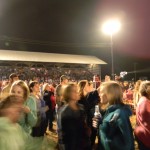 event such as this. The crowd was responsive and singing along, despite a strong prevailing wind that was a bit overbearing at times. About an hour into our show some massive lightning strikes began to appear on the horizon, so we did a couple of more songs to finish our set.
event such as this. The crowd was responsive and singing along, despite a strong prevailing wind that was a bit overbearing at times. About an hour into our show some massive lightning strikes began to appear on the horizon, so we did a couple of more songs to finish our set.
Our show complete, we tore down our gear and found our way over to the ‘Bluegrass Barn’ where the afternoon band was engaged in a little ‘pickin’ and grinnin’ after party. Rhett even sat in for a couple, leading the band through the Hank Williams classic ‘Honky-Tonkin’ and a couple of other rarities. The spirits were high, and everyone from this nice community made us feel right at home. A little while later, Steve made a mad dash with the bus across the muddy field, tires spinning every inch of the way. When we finally made it to the street, he made a big sigh of relief, perhaps having flashbacks of having to be towed out of a mud bog in Alabama earlier in the summer. Even if we had got stuck I wouldn’t have been too worried, at this show we definitely had ‘friends with tractors”. A few minutes later, and we were rolling down the highway. Thanks for making it a great event Shelbina!
Playing for free or getting paid to play; What is playing music worth to you?
Anyone who has ever gigged in Nashville knows that it is hard to make any real money by playing in the clubs around town. Aside from a very small handful of gigs that might pay $75-$100 per player, most offer minimal to no pay – some offering a base pay $20 to $30 plus tips, a lot more offer tips only (which often means essentially playing for free), and a few are even pay to play. Even on the base pay plus tips gigs quite often a player will only take home $25 or $30.
So from time to time the “playing for free” debate rears up in conversations. Some say that performing music in public for free is the only way they can gain experience, obtain exposure, make connections, and have any sort of musical life beyond practicing in the basement. Others claim that playing for free makes it harder to receive fair (or any) compensation for their services. Why would clubs and venues pay for bands and players if most will do it for free?
While both are legitimate arguments, to understand why things are the way they are I think it is important to consider the overall role of music and musical performers throughout history, not just in today’s world.
Daniel Levitin, in his book “This Is Your Brain on Music” talks about music being at the heart of human evolution.
“No known human culture now or anytime in the recorded past lacked music. Some of the oldest physical artifacts found in human and protohuman excavation sites are musical instruments.”
He continues
Even more so in non-industrialized cultures than in modern Western societies, music is and was a part of the fabric of everyday life. Only relatively recently in our own culture, 500 years or so ago, did a distinction arise that cut society in two, forming separate classes of music performers and music listeners. Throughout most of the world and for most of human history, music making was as natural an activity as breathing and walking, and everyone participated. Concert halls, dedicated to the performance of music, arose only in the last several centuries.
With that, I state my case that music has always been there and is an important and crucial part of our being. It is perhaps the earliest form of communication. Somewhere along the way this art form, this way of life, morphed into a product, or a commodity.
In the book “Muse Power: How Recreational Musicmaking Heals Depression and Other Symptoms of Modern Culture” by Cheri D. Lunn writes:
Prior to the 20th century, the concept of selling music wasn’t really commonplace. One of the very first to consider music as a marketable commodity, was Wolfgang Amadeus Mozart. “In the mid-to-late 1700s, performers and composers such as Wolfgang Amadeus Mozart began to seek commercial opportunities to market their music and performances to the general public.” (5 Wikipedia /Dear Constanze The Guardian) Before that, in more traditional cultures, the Griots, bards, and musicians were cared for by their communities, as equals in the tribe doing their part to contribute. In Europe, up until the 1700’s music was supported by patronage from the aristocracy, or the church, and so there was no need for artists to sell themselves; and so the concept of selling music had just not yet come to be.
A crucial change in the history of folk music began during the twentieth century with folk artists adopting the very western concept of “marketing for money,” or “selling” the music of the people. In this time, a new genre of popular music arose that basically became an imitation to the original traditions of folk music as it was sung by ordinary people. These “folk” artists marketed themselves alongside more popular and modern emerging artists and created a niche for themselves by performing traditional music and songs in amplified concerts, and disseminating their work by recordings and broadcasting.
But along with the commercialization of music and musical performers, especially now in the digital age, comes somewhat of a desensitization to music, or what I call a ‘dumbing down’ of the masses in this regard. In today’s world, music is heard everywhere – from traditional advertising like TV and radio commercials to ring tones and ring backs, from video games to iPods, today’s Internet generation is saturated with digital music overload. In many situations, recorded music is now free, and with the advent of software like garage band, millions can now make homemade recordings to further flood the airwaves. In the midst of this oversaturation, TV shows like “American Idol”, “Nashville Star”, and “America’s Got Talent” have perpetuated the false reality that the masses can also now obtain superstardom.
Put all this together, and you’ve got more people than ever trying to get into the “music business”. But as millions more each year try to enter this world, the opportunities for them will inevitably shrink. There are only so many bars and nightclubs that need live music.
If you consider this history, it is fair to say that the concept of being paid for your music, or paid to play your music, is relatively new and largely an invention of our modern capitalistic society. Don’t get me wrong, I’m not suggesting we abandon this concept, this is how I am currently earning the bulk of my living. What I am suggesting is that the evolution of the paid musical performer may have been accidental, and is not necessarily a sustainable vocation in this modern world.
Music belongs to everybody. We need to better understand the role that music has played in our history, and how the cultivation of music as a part of our culture can benefit our world as well as the futures of our children. Does our future hold a world in which musical performers are paid for their ‘services’, or will the performance of music one day return to something that is shared by everybody? Did society really benefit when music was turned into a product? Do we deserve to be “paid to play”? I don’t know if I’ll always be able to earn a living from music, but even if one day I can’t, I’ll always play music, doing so enriches my life.
What is music, and the art of performing it worth to you?
Does Practice Make Perfect?
When I was 12 years old I was inspired to learn how to play the guitar after hearing the music of Jimi Hendrix. As I began learning, I quickly realized I would have to put a lot of effort into this endeavor to be able to make the kind of music that Jimi inspired me to make. So I dug in, and the more I dug in and applied myself, the better I became at my craft. As I got better, it started to become more fun too. Early on I made the connection that the more I applied myself (by practicing, wood shedding, experimenting, etc.) the more I enjoyed guitar playing. For me, practicing my guitar, and enjoying the act of guitar playing go hand-in-hand, and I never viewed practicing as a chore I had to do.
As the years churned on I never stopped applying myself. I eventually went to Berklee, began playing professionally, and still work at improving and honing my skills 20 years later (even though I can maintain a decent level of proficiency without doing so). While some people along the way have suggested that I practice more than I need to, I disagree. Putting in such a big effort over a long period of time has not only made me a better musician, it’s made me a better person. It’s benefited my life in ways that go way beyond music. If you can teach yourself self-discipline through the mastery of your craft, you will forever have an increased self-discipline in every facet of your life, more patience, problem-solving skills, the list goes on.
In my opinion, too many musicians coming up in the world today learn a bare minimum of proficiency early on and then just coast. So many are consumed by aspirations of fame and fortune that they miss out on the rewarding feeling one can get from just working towards being great at something. Whether you you play music as a career or just for fun, I believe that the more you put into developing your craft, the better your whole life will be. Practice might not make you perfect, but it will make you better.
My interview with the record company dude
Last week I posted a blog in which I asked you (the reader) what questions you would ask somebody from a record label if you had access. That blog prompted some pretty interesting questions, and when I conducted my interview today with EJ Bernas, Senior Director of Southwest region of Universal Music Group, those questions made up the bulk of what I asked him. The interview was lengthy and informative, and a lot of work lies ahead (transcribing, editing, proofing, etc.) before this fascinating conversation will be print ready. So for now, I would just like  to share a few high points of this unique experience.
to share a few high points of this unique experience.
I arrived in downtown Nashville just before 1 PM and found a parking spot in front of the Bridgestone arena. After feeding some quarters into the meter (three dollars only got me two hours) I walked a couple of blocks over to the UMG headquarters, located on Commerce street. After taking the elevator to one of the top floors of an otherwise unsuspecting office building, I emerged into the lobby and found my way to the receptionist. The friendly young lady informed EJ that I had arrived, and a moment later he came out to meet me. We retreated into a large comfortable conference room which had a spectacular view of downtown Nashville.
 I could write an entire article just about what I saw in those few short seconds gazing out that window. The roof of the Ryman Auditorium just below us, the hustle and bustle of people milling about on Broadway, the Bridgestone arena, the controversial new skyscraper still being constructed, the Cumberland River in the distance – a city truly alive in so many ways. Behind every window of the hundreds of buildings visible from this spot was a story. For every car that passed by on the streets below, another story. Some say that this is a city built on dreams, and from this vantage point I could literally feel that kind of intangible element that fuels such a mysterious place.
I could write an entire article just about what I saw in those few short seconds gazing out that window. The roof of the Ryman Auditorium just below us, the hustle and bustle of people milling about on Broadway, the Bridgestone arena, the controversial new skyscraper still being constructed, the Cumberland River in the distance – a city truly alive in so many ways. Behind every window of the hundreds of buildings visible from this spot was a story. For every car that passed by on the streets below, another story. Some say that this is a city built on dreams, and from this vantage point I could literally feel that kind of intangible element that fuels such a mysterious place.
“This is an amazing view. Do you have a view this cool from your office too?” I asked. “You bet, my office is right next door. You can see the roof of the old church (Ryman) below” he said as we both gazed across the vast expanse. With that, we each took a comfortable spot at the table and dug into an hour and a half discussion about the state of the recording industry, radio, and how today’s aspiring artists fits into that world (at times the discussion became more like how the recording industry and radio fit into the world of the aspiring artist.) Like I said,  the contents of this interview still need to be transcribed and reviewed before I can share any of it, so for now you’ll have to just settle for me simply bragging about this day.
the contents of this interview still need to be transcribed and reviewed before I can share any of it, so for now you’ll have to just settle for me simply bragging about this day.
At one point during the interview, EJ’s boss walked through the room and I received a brief introduction. A little while later another man walked through, and I was again introduced, this time to the head of A&R. EJ explained to me that UMG (Universal Music Group) consists of MCA, Mercury, and Lost Highway Records and represents artists like Billy Currington, Julianne Hough, Reba McEntire, Randy Rogers Band, George Strait, Sugarland, Jamey Johnson, Josh Turner and Shania Twain, among others. Even though I’m not aspiring for any sort of success as a radio star, it did occur to me just how fortunate I am to know someone like EJ – a warm and open individual gracious enough to give this glimpse into a world in which so many aspire, yet so few ever travel.
After the interview was over, he walked me back out to the lobby where I had the receptionist snap a quick picture of the two of us. I thanked him again and made my way back to my car. It was definitely a learning experience for me and I know this interview will add much valuable perspective to all the aspiring artists and musicians who will eventually read it. Thanks again EJ for making my day, and my book.

Rhett Akins Plays Balloons, Tunes and BBQ Festival in Bowling Green Kentucky
Saturday night’s show at the U.S. Bank Balloons, Tunes and BBQ Festival in Bowling Green Kentucky turned out to be a huge success, but earlier in the day things were looking pretty bleak. All week long the weather forecast showed a strong possibility of severe weather for this area, as the remnants of Tropical Storm Hermine were projected to move through. When we arrived on site at the Warren County Regional Airport a strong steady wind was already blowing, despite an otherwise beautiful sunny day.
Right around the time we were about to start micing up our instruments for soundcheck, the sky grew ominously dark, and a few minutes later a strong gust of wind knocked over a large column of PA speakers. Fortunately, nobody got hurt, but it was a frightful moment. As a downpour was imminent, we quickly scrambled to put tarps over our stage gear. Minutes later we watched from the bus window as a strong steady rain pummeled the airport grounds. Just when we thought our day was completely doomed the rain subsided, and a short while later the sun returned to dry out the rain soaked grounds.
 As it turns out, we got real lucky and it never did rain again. The first two days of the festival had been a complete washout due to the weather, but by late afternoon the winds had died down, and some hot air balloons began to permeate the sky for the first time on this weekend. By the time the first group, Easy Street, went on stage at 5:30 there was already a couple of thousand people in front of the large mobile stage, and their set was well received. A little while later, after the second band, Floord, was finished with their set, Nick Hoffman (Kenny Chesney’s fiddle player) took the stage with his band. During Nick’ set I organized and led a large meet and greet backstage with some radio station contest winners who were more than excited to meet Rhett.
As it turns out, we got real lucky and it never did rain again. The first two days of the festival had been a complete washout due to the weather, but by late afternoon the winds had died down, and some hot air balloons began to permeate the sky for the first time on this weekend. By the time the first group, Easy Street, went on stage at 5:30 there was already a couple of thousand people in front of the large mobile stage, and their set was well received. A little while later, after the second band, Floord, was finished with their set, Nick Hoffman (Kenny Chesney’s fiddle player) took the stage with his band. During Nick’ set I organized and led a large meet and greet backstage with some radio station contest winners who were more than excited to meet Rhett.
At about 8:45 it was finally our turn for some stage time, the crowd had now swelled to around 10,000, and was at the peak of this annual  event’s outing. We dug in hard for a rockin’ 90 minute show, the crowd into it from the onset. About halfway through our show, Rhett brought up his son, Thomas Rhett to sing the soon-to-be classic ‘Duck Blind’. After this well received rendition, a woman somewhere near the front row yelled out “He’s real sexy too!” This helped prompt Rhett to prod young Thomas into doing one more song, ‘Tobacco’, one of Thomas’s original compositions which he performed solo acoustic. Apparently, Thomas takes after his dad, who bragged about his son’s first cut as a songwriter on Jason Aldeans’ latest album, and the fact that “Some day soon you’re going to be hearing Thomas Rhett on the radio too!” After Thomas left the stage to a roaring applause, we continued on with our set, and a little while later Rhett invited up Nick Hoffman to sit in for a couple of tunes on the fiddle. Rhett ended the show by playing a solo acoustic version of “Gimme That Girl” the blockbuster hit he wrote for Joe Nichols. This soft and soulful piece helped to wind down the electricity in the crowd, and upon its conclusion they began to slowly exit the concert grounds.
event’s outing. We dug in hard for a rockin’ 90 minute show, the crowd into it from the onset. About halfway through our show, Rhett brought up his son, Thomas Rhett to sing the soon-to-be classic ‘Duck Blind’. After this well received rendition, a woman somewhere near the front row yelled out “He’s real sexy too!” This helped prompt Rhett to prod young Thomas into doing one more song, ‘Tobacco’, one of Thomas’s original compositions which he performed solo acoustic. Apparently, Thomas takes after his dad, who bragged about his son’s first cut as a songwriter on Jason Aldeans’ latest album, and the fact that “Some day soon you’re going to be hearing Thomas Rhett on the radio too!” After Thomas left the stage to a roaring applause, we continued on with our set, and a little while later Rhett invited up Nick Hoffman to sit in for a couple of tunes on the fiddle. Rhett ended the show by playing a solo acoustic version of “Gimme That Girl” the blockbuster hit he wrote for Joe Nichols. This soft and soulful piece helped to wind down the electricity in the crowd, and upon its conclusion they began to slowly exit the concert grounds.
 It was a long day, but a good day, and we were all thrilled that the weather wound up being on our side. While this isn’t always the case with these kinds of outdoor shows, past experience has taught me to always hope for the best, while preparing for the worst. We’ve got two more outdoor shows on the books in the upcoming weeks. Hopefully, we’ll get lucky on those too!
It was a long day, but a good day, and we were all thrilled that the weather wound up being on our side. While this isn’t always the case with these kinds of outdoor shows, past experience has taught me to always hope for the best, while preparing for the worst. We’ve got two more outdoor shows on the books in the upcoming weeks. Hopefully, we’ll get lucky on those too!
If you had an hour with someone who works at a major record label what would you ask them?
Next week I’m conducting one more interview for my book project ‘The Nashville Musician’s Survival Guide’. Upon a recent review of the book’s manuscript I realized I haven’t thoroughly addressed the role that record labels play in the Nashville music industry. So this has prompted me to set up an interview with one of my colleagues at MCA/Universal Group. I’ve got a full hour to discuss the current state of the ‘record industry’ and would like your input.
I have a few questions I already plan on asking;
- In regards to signing new artists and acts, what are record companies looking for?
- Are solo artists more attractive to the label than bands?
- How important is it for a prospective artist or band to have a following prior to signing with a record label?
- How does an obscure startup artist in Nashville gain the attention of the labels in a community that is so oversaturated with talent?
- Do you think FM radio has any future?
These are the first questions that come to my mind, but as I’m not interested in pursuing a record deal I may not be as tuned in to this world as someone who is. I want to know what you want to know. Pretend for a minute that you have the ear of someone at MCA for five minutes. What three questions would you ask? And please, no smart aleck questions like “Will you come see my band next Wednesday at the Cadillac Ranch?” or “Can I give you one of my CDs?”
If anyone out there can present me with some intriguing questions, I’ll include them in my interview next week and post the responses.
Thanks for participating!
My name is Eric Normand and welcome to ‘Country Concerts’!
I was talking to a college student a while back who said he was interested in becoming a tour manager. It turns out that one of his best friends is an aspiring young artist with a bright future, one who will likely need a tour manager someday. “What does a tour manager do?” he asked. The specific duties can vary depending on the tour, but in general, the tour manager oversees all aspects of the touring entourage and coordinates each concert with the event buyer, production company, and all other pertinent parties. My job as tour manager for Rhett Akins requires me to wear a lot of hats; tour manager, band leader, lead guitarist – officially; and guitar tech, stage manager, assistant merch person, travel agent, part-time bartender, and occasional guidance counselor – unofficially. There are eight members of our entourage – Rhett, myself, three other band members, a sound engineer, a merch person, and a bus driver, and it is my job to make sure they are well taken care of when we are touring. To give some perspective, I thought it might be fun to take you on a recent one off with Rhett and gang. This post will be a bit long, but then again so is the day of a tour manager.
Rhett Akins
09-04-10 – Clay County Days Festival – Manchester Kentucky
It was about 11:30 PM on Friday, September 3rd when Kelly and I arrive to the bus near Opryland in Nashville, TN. Most of the other guys are already there and our sound engineer, Mike Jaeger, and bassist, Clint Jacobs, help me load my gear , Rhett’s merch, and some bus stock into the bays underneath the bus. Assistant tour manager and merch specialist, Kelly Normand, begins stocking the refrigerator with bottled waters and putting away some of the other supplies (paper plates, solo cups, etc.). On this run we have a substitute driver, and after making his acquaintance, I give him some paperwork and discuss some specifics of the trip. A little while later we pull out, bound for London, KY, the location of the hotel we would be using for our show at Rawlings Stinson Park in Manchester Kentucky. My official duties complete for this workday, I enjoy some chill time in the front lounge with the guys for a bit before heading to bed (or heading to bunk, rather).
Like most of our weekend runs, our bus arrives to a hotel parking lot sometime early morning and I awake a few hours later to begin my day. My first duty is getting checked into our hotel rooms, and this can require a special skill set (called charm) to get into these rooms at the early hour of 9 AM (most hotel check-in’s are between 1 and 3 PM). After offering a warm greeting to the hotel front desk clerk, I introduce myself – “My name is Eric Normand, I’m the tour manager for Rhett Akins and we’ve got four rooms booked with you. I realize it’s still kind of early, but I was wondering if any of them are ready.” “We should have a couple of rooms cleaned and ready in about 20 minutes and the other two in about an hour” she notifies me. “Great, thanks.” I return to the bus and eat some breakfast before returning to the hotel lobby for the room keys.
By noon, most everyone is up and hanging out in the front lounge. Were watching “Stand by Me” on the flatscreen TV as we head off for the venue, a 20 mile, 30 minute drive. While enroute I call my contact at the event to notify him we are almost there. We arrive on site and back the bus into a fire station parking lot across the street from the park. This is the closest the bus will be able to get to the stage which is located about an eighth of a mile away, and I quickly realize I’m going to get in a fair amount of walking on this sunny 70° day. I walk off the bus and meet, Gene, my go-to guy from this event for the day. “Tell me what you guys need, and I make it happen.” he informs me. “Everybody’s pretty hungry, so the bus stock would be great. After that we’ll need a pickup truck and some stagehands to cart the gear over the stage, and a runner to take our driver back to the hotel.” A few minutes later our bus stock is arriving, and I began to coordinate the load in.
After everybody eats, I find the runner who then takes our driver back to the hotel to sleep, and we begin our set up and sound check. As I still have a lot of details to tend to, I try to set up my gear as quickly as possible. Before I can finish, the event buyer requests a brief meeting with Rhett, as well as the handling of settlement (payment). Gene takes me via golf cart back to the bus so we can bring Rhett to meet the owner who is down the street cooking our BBQ dinner on a giant smoker. A little while later I’m back to the stage with sound check in full swing. Mike has done a good job of ‘ringing out the monitors’ and we are pretty much ready for Rhett. After running through two songs and making a few minor adjustments everybody’s pretty happy with the sound, so we ‘spike and strike’ our monitors and pedal boards to make room for the opening act.
Typically, the conclusion of sound check would mean that we’re all returning to hotel rooms for showers, but as this day had a late afternoon sound check with an early show time, there wasn’t enough time. I told everyone this in advance, and most of them had already taken a quick shower late morning at the hotel. So today, it’s a couple hours of downtime on-site. Some of the guys go walking around the festival for a bit, others hang out on the bus watching college football, while Kelly and I explore a walking trail off the back side of the park. Dinner was served in the firehouse at five o’clock – a massive spread of pulled pork, ribs, potato salad, and some outstanding homemade creamed corn. In fact, the creamed corn tastes so much like corn, that I realize how little so many other ‘corn products’ actually taste like corn.
After dinner it’s time to set up our merch station, so I accompany Kelly to her tent to make sure she has everything she needs. Upon our arrival to her side stage location, I see that the event has provided a 10×10 pop-up tent, table, and a half a dozen folding chairs. While Kelly begins setting up her merch, I find one of the production company workers and ask him to run some power over to the tent for lighting. Once the lighting is set I begin preparing for Rhett’s meet and greet by texting him to notify him that it’s 10 minutes out. I verify with Gene that the meet and greet party has gathered, and deliver Rhett, sharpie in hand, to the green room. During the middle of this autograph-signing photo-op I get a text from Kelly stating that she needs more change and that one of her lights has a burned-out bulb. I locate a spare bulb and $100 worth of 5’s, make another walk to the stage area, and return to help wrap up the meet and greet.
I escort Rhett back to the bus, put a fresh battery in his in-ear wireless belt pack, and return to the stage to reset my gear. The opening band now finished and the stage clear, I place my pedal board, tune my guitar, and check my rig with a few quick power chords. I continue on to Rhett’s position, tuning his acoustic and checking it for signal, checking his vocal mic in the monitors and in the house, installing a pic clip with guitar pics to his mic stand, and placing set lists and a beverage on the stage floor by his monitor. The other band members are all at their stations checking their rigs, and a DJ is selling himself over the mic in that nonstop annoying ramble that only a DJ can do. The park is filled to capacity, somewhere around 4000, and we’re ready to go. I make one more walk back to the bus to shuttle Rhett over via golf cart. A few minutes later and were off and sailing on our 90 minute ‘countrified’ rockathon.
 In a day so full of endless details, the nightly concert is by far the high point for me. For these 90 minutes I get to play my guitar with a great band, behind a great front man, and it’s all about the music for me. Rhett, being the quintessential performer, possesses the uncanny ability to render a crowd in the palm of his hands in about as much time as it takes him to walk out onto the stage. The concertgoers on this particular night are no exception to this rule, and Rhett quickly wins them over. For this brief period, it doesn’t even seem like I’m working, after all, this is what I set out to do in the first place. Aside from our usual repertoire, one standout is an impromptu performance of Bon Jovi’s ‘Wanted Dead or Alive’ (playing in all those early cover bands sure comes in handy every once in a while) and Rhett’s son, Thomas Rhett, joining us to sing a great rendition of ‘Duck Blind’. 90 minutes later our performance is complete, and the captive audience slowly makes their retreat as Rhett rides back to the bus via golf cart while the band tears down the gear. I quickly transition from musician mindset back to road manager and instruct Gene to pull up a truck next to the stage for load out. We load the gear, ride over to the bus, and load it into the bays. I send the runner to pickup our driver, they return about an hour later, and we fire up the bus to ride off into the night. My workday done, I enjoy a frosty beverage in the front lounge with the gang. I awake on the bus the next morning back in Nashville, load my car, and get the fuel receipts and some other paperwork from the bus driver. “Great job everybody, see you next week!”
In a day so full of endless details, the nightly concert is by far the high point for me. For these 90 minutes I get to play my guitar with a great band, behind a great front man, and it’s all about the music for me. Rhett, being the quintessential performer, possesses the uncanny ability to render a crowd in the palm of his hands in about as much time as it takes him to walk out onto the stage. The concertgoers on this particular night are no exception to this rule, and Rhett quickly wins them over. For this brief period, it doesn’t even seem like I’m working, after all, this is what I set out to do in the first place. Aside from our usual repertoire, one standout is an impromptu performance of Bon Jovi’s ‘Wanted Dead or Alive’ (playing in all those early cover bands sure comes in handy every once in a while) and Rhett’s son, Thomas Rhett, joining us to sing a great rendition of ‘Duck Blind’. 90 minutes later our performance is complete, and the captive audience slowly makes their retreat as Rhett rides back to the bus via golf cart while the band tears down the gear. I quickly transition from musician mindset back to road manager and instruct Gene to pull up a truck next to the stage for load out. We load the gear, ride over to the bus, and load it into the bays. I send the runner to pickup our driver, they return about an hour later, and we fire up the bus to ride off into the night. My workday done, I enjoy a frosty beverage in the front lounge with the gang. I awake on the bus the next morning back in Nashville, load my car, and get the fuel receipts and some other paperwork from the bus driver. “Great job everybody, see you next week!”
This one-off is typical for a small to midsized tour, such as ours. On tours of this size and nature, the tour manager advances these details over the days and weeks preceding the show (quite often it is these advance phone calls and e-mails that make or break how well each show day and show goes). In the days after a weekend run, the tour manager addresses payroll, bank deposits, bus lease payment, and some light accounting duties while advancing upcoming shows. On a larger more active tour, there would simply be more tour members, more tour buses, and more equipment, and they would likely be staying out for longer periods of time. A day similar to the one I just described would be repeated in succession, kind of like Groundhog Day, each day beginning the same as the last – the view of an obscure parking lot from the bus window, somewhere far from home. On one of these tours, the ‘TM’ would still be the grand overseer, but would be delegating many of these roles to others – stage managers, guitar techs, etc. He still has to deal with all the same kinds of details, he just doesn’t have to wear as many hats. Don’t get me wrong, I’m not complaining about wearing so many hats, he probably doesn’t get to play guitar during the show.
My name is Eric Normand and welcome to ‘Country Concerts’!

What Would You like to Know about Nashville? Part Two: Your Questions and My Answers
In my blog yesterday I asked for your questions about Nashville, and received several good ones in the comments section and on my Facebook page. So I decided to put them all together with my answers in today’s blog. Here’s what I know about what y’all wanted to know.
Who do I need to meet and where to hang out to get exposure as a musician?
This is one of the biggest questions people ask. There is no short easy answer either. That question and the answers to it are essentially what my book project is all about. Here are the short answers:
“Who do I need to meet to gain exposure as a musician?”
Everyone in the music community that you possibly can! With each musician or music entrepreneur you meet comes a whole new set of possibilities. You never know where each new road might lead. Keep in mind that the identity of many musicians and industry professionals won’t always be obvious either. You could be standing in line at the supermarket next to a record producer and not even know it. Somebody that looks like a homeless person in a bar could be a hit songwriter. And of course, just meeting these people is only a first step. Most people that become successful in this business do so by slowly nurturing relationships over a long period of time.
“Where do you need to hang out to gain exposure as a musician?”
In Nashville, the face-to-face meeting of musicians in nightclubs and music venues around the city still works best. You can’t go wrong by making the rounds at the clubs on Broadway, Music Row, the Fiddle and Steel, the Bluebird Café and the Commodore Lounge for songwriters, etc.
In this day and age a lot can be accomplished via the Internet as well. I have made some amazing contacts for my book project just by sending e-mails to industry people I found on websites or Google searches. With this approach I have had correspondence with Derek Sivers (founder of CD baby), a music business professor at the University of Miami, etc. The Internet can enhance your visibility as a musician or performer but should not replace face-to-face encounters in public.
Where are the Nice Southern Gentlemen?
I’m not sure what you’re looking for exactly. But I would say that most men that live in the South are somewhat ‘gentlemanlike’ (you know that whole Southern hospitality thing). It even wears off on some of us northern transplants eventually!
I’m wondering if it would be a good place to put some of my uncle’s shows. They’re all cabaret style shows. Most music based.
Nashville might be a good place for that kind of show, but then again it might not be. It all depends on whether or not he has a draw here. There are many decent music venues in Nashville, so if he has built a big enough fan base, via touring and/or the Internet, he might do okay. But if he’s not known in this region he will have a hard time drawing a crowd, and the local Nashville venues won’t pay much to an unknown act. He might want to consider trying Branson, Missouri, as that city is more known for these types of shows. Of course, they will expect him to draw as well.
Favorite Restaurant?
Generally speaking, I make it a point to never eat in restaurants, as restaurant food is generally unhealthy. But there are plenty of popular restaurants here for those who do enjoy them. This 2009 article from the Nashville scene ‘Best of Nashville 2009: Food and Drink’ outlines some of the city’s most popular places.
Personally, I would recommend buying some good healthy ingredients at Whole Foods (either at Green Hills, or in Franklin), and cooking a great meal at home. You can find some great recipes on a site called Do It the Hard Way.
What songs do you need to know if you want to jam at Fiddle and Steel?
To be prepared to sit in at the Fiddle and Steel, or any other similar bar in Nashville for that matter, knowing what I call ‘The Nashville 100’ is essential. The Nashville 100 is a list I have comprised of what I have found to be the most commonly covered standards played in Nashville. The list is posted on the Survival Guide site, follow this link to view it http://nashvillemusicianssurvivalmanual.com/list.html. While these aren’t the only songs that might be played, knowing these songs will give you a lot of common ground with most players in town.
Best places to live? I hear a lot about east Nashville, so that must mean its over-crowded with wanna-be hipsters. Any other cool neighborhoods off the radar and reasonably priced?
The neighborhoods in east Nashville can vary greatly. There are some decent areas and some rough spots as well, but apartment rentals in that area are generally affordable. The same thing could be said about many parts of the city. Reasonably priced apartments ($600 – $750 for a single bedroom) can be found in Belmont, Bellevue, Donelson, Gallatin, and many other outlying communities.
The desirability of an area could also be determined by whether or not you will have children living with you (ie quality of school systems, crime rates, etc.), and if you will be commuting in and out of the city during daytime hours (East and North of the city generally have the worst traffic backups).
What kind of gear should a guitar player have for studio gigs vs touring gigs?
Many of the successful Nashville based session guitarists have rigs consisting of multiple guitars; Teles, Strats, Gibsons, PRS etc., multiple heads; Class A style head (Matchless, Dr. Z, etc.), Marshall style head, and maybe a Fender style head, and a refrigerator rack full of effects with some type of pedal board set up as well. This kind of setup would be more typical for a full time A list session player. There are plenty of players who work in the studio on much simpler rigs but still have the ability to deliver a wide range of tones. Of course there are some ‘niche’ studio players that only have one basic sound and get calls to do that one thing they do best.
As far as touring rigs go it depends on the gig. But for most country/pop/rock gigs, a Tele style guitar, Class A combo, and a pedal board with the essentials (a clean boost or compressor, overdrive, delay, and tuner) will suffice (amp and pedals in Anvil style cases). A backup guitar is always a good idea too.
How are you liking it? Bartlett St. to “oprayland”
I’m loving it! Bartlett Street in Kingston New Hampshire was a great place to grow up, but Nashville has definitely become the home of my second life. There was a bit of culture shock over the first couple of years, but I am now well adjusted. I still do miss a lot about New England – friends, family, having the ocean in my backyard, autumn foliage, summers where it’s not 100° every day for four months. But the experiences I’ve had, the people I’ve met, the places I’ve been, the skills I’ve gained, I wouldn’t trade it for the world!
Thanks again everybody for your participation in my informal survey, it definitely gave me a lot of perspective. Many of these questions are answered in much greater detail in my book project which is still in the works, but some of them are bringing up points I wasn’t already thinking of. Ultimately, some of these new points will also be addressed in the book.
For those of you that haven’t yet fully explored this site, you will find that some of these questions are addressed in more detail within it. I’m thrilled with the response I got to my query and urge you to ask more questions if you have them, preferably in the comments section of these blogs. Thanks again and happy reading!
What Would You like to Know about Nashville?
Nashville is a destination for people from all over the world, and those considering relocation to Music City often post questions on the Nashville craigslist and other message boards about what it’s like to live and work here. While my website and soon to be completed book ‘The Nashville Musician’s Survival Guide’ serve to answer these kinds of questions, your input is badly needed.
In the spirit of providing the information that you are looking for the most, I would like to conduct a kind of informal survey.
I want to know what you want to know about Nashville. What you want to know about living here, working here, becoming involved in the music community, the climate, the culture – you name it.
If I know the answer, I’ll post my thoughts and feedback. If I don’t know the answer, I’ll research it and post my results.
In the true spirit of perpetuating a sense of community in a music business that often lacks it, I would like to keep this discussion public. So I urge you to post your questions as comments here on this blog rather than sending me e-mails.
Your questions and thoughts will help me to provide the most accurate information possible and will help many other musicians in the process. Thanks for participating!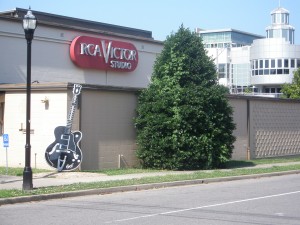
Rhett Akins plays Lambda Chi Alpha frat party at Troy University – Friday August 20, 2010
It was about 5:00 PM when we pulled our tour bus up to the newly built Lambda Chi Alpha frat house on this hot and humid summer day in the deep South. The kids greeted us with much 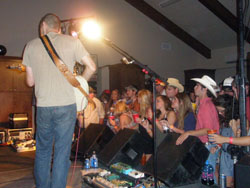 excitement as this party was the first to be held in their brand-new frat house. Upon entering the party room where we would be performing we were a bit surprised at the rooms size – about 30 x 30 with the stage and PA system taking up almost half of the available space. But isn’t this what frat parties are all about? Packing as many drunk college kids as you can into a small intimate setting conducive to chaos and mayhem. It was perfect. All the right ingredients were there.
excitement as this party was the first to be held in their brand-new frat house. Upon entering the party room where we would be performing we were a bit surprised at the rooms size – about 30 x 30 with the stage and PA system taking up almost half of the available space. But isn’t this what frat parties are all about? Packing as many drunk college kids as you can into a small intimate setting conducive to chaos and mayhem. It was perfect. All the right ingredients were there.
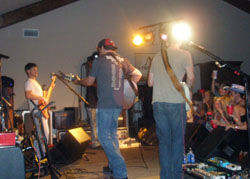 We loaded in our gear, set up, and began our sound check. The Rhett Akins band is as much a rock band as it is a country band, and when we began checking our drums and instruments we were a bit concerned as the volume seemed ungodly in this tiny space. Granted, the room was empty at this point, so we were hopeful that the addition of some bodies would help tame down the volume a bit for the show. This proved to be the case, and by the time we hit the stage for our 11:30 PM start time the kids were raring to go.
We loaded in our gear, set up, and began our sound check. The Rhett Akins band is as much a rock band as it is a country band, and when we began checking our drums and instruments we were a bit concerned as the volume seemed ungodly in this tiny space. Granted, the room was empty at this point, so we were hopeful that the addition of some bodies would help tame down the volume a bit for the show. This proved to be the case, and by the time we hit the stage for our 11:30 PM start time the kids were raring to go.
“Down South” our typical opening number for shows in this part of the country, rendered us off to a roaring start, and the sounds of the band booming out the open doors and windows began drawing in more patrons from the adjoining courtyard. By the end of our second song “I Brake for Brunettes” the room was packed full and the energy was building by the second. A good-looking crowd, as far as frats go, the front row of folks were right up to the edge of the stage, with several attractive girls dancing and singing along in close proximity for some added inspiration. At one point during the show a couple of cuties hopped up on to the stage, dancing and singing with Rhett for a song.
The festivities maintained a high level of excitement right through to the very end of our blistering two hour set, and by the time we walked from the stage we were all dripping with sweat. We packed up our gear, loaded the bus, and said goodbye to the more than appreciative fraternity brothers. Their house had now been officially “broke in” and it was our honor to bust the cherry for them. Thanks Lambda Chi Alpha – we had a great time!
